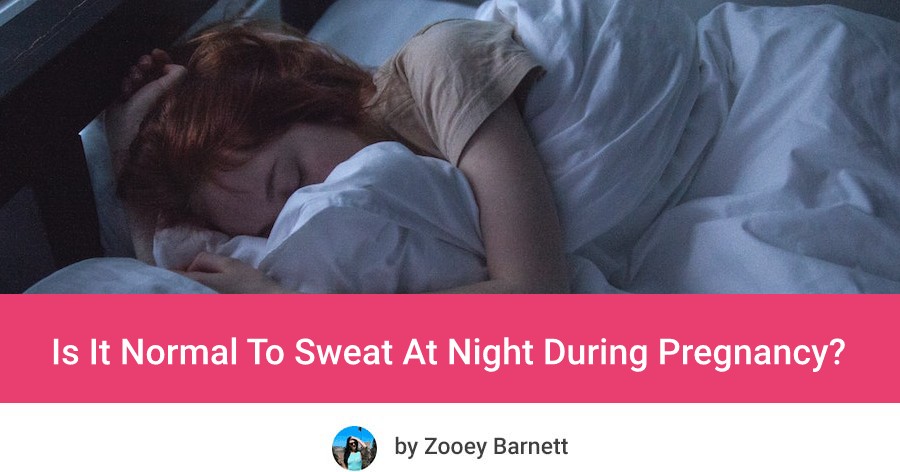Are you experiencing excessive sweating at night and you’re worried that it may be a sign that there is something wrong with your pregnancy? Although usually nights sweats are normal during pregnancy, sometimes they may indicate more serious health issues so you should not ignore them.

Pregnancy is a time of immense physical and emotional changes for a woman. During those night months, as the body adapts to the growing baby, many women experience a variety of physical changes, including night sweats.
Sweating at night during pregnancy is usually normal and quite common.
However, it can be a source of discomfort and anxiety for many expecting mothers.
In this article, I will explore the causes of night sweats during pregnancy and discuss ways to manage them.
Experiencing night sweats during pregnancy can be an emotionally difficult time for many women.
Not only can night sweats be uncomfortable and disruptive to sleep, but they can also cause feelings of anxiety and concern.
Many women worry that night sweats are a sign of something wrong with their pregnancy, or that they are not taking care of themselves properly.
It is important to remember that night sweats are a common occurrence during pregnancy and are usually nothing to worry about.
However, you should remember that in some cases pregnancy night sweats can be a symptom of some health problems, which I’m going to discuss later so keep on reading!
This article is not a substitute for medical advice.
Are Hot Flashes & Night Sweats During Pregnancy Normal?
Usually hot flashes and night sweating in pregnancy are normal and don’t mean there is something wrong with your growing baby. According to studies 35% of women experiences nighttime hot flashes throughout pregnancy and 29% of women experiences them after the delivery.1
Even though excessive sweating at night seems to be a perfectly normal physiological change during pregnancy, if you’re concerned about it, you should definitely seek for professional medical advice!
What Causes A Pregnant Woman To Sweat?
Here are the most common causes of excessive sweating during pregnancy.
1. Hormonal Changes
During pregnancy, woman’s body produces more estrogen and progesterone, which can cause increased sweating. According to a study these two hormones have a huge impact on thermoregulation.2
Studies show that progesterone may promote higher body temperature, while estrogen plays a role at decreasing body temperature by… sweating!
All those hormonal shifts in early pregnancy can cause you to wake up hot and all sweaty.
These rapid hormone fluctuations can cause pregnant women to sweat more during the day too. One of the solutions for that is getting a pregnancy-safe deodorant (free of nasty chemicals), that will help you stay fresh and dry!
2. Changes In Thyroid Hormones
It turns out that not only sex hormones play a role at regulating your body temperature, thyroid hormones are also very important for regulating your metabolism and body temperature. If you have too much thyroid hormone it may cause you to feeling overheated (not only at night, but also during the day).
During your first trimester, levels of thyroid hormones T4 and T3 go up, and then slightly go down in 2nd and 3rd trimester. At the same time, TSH decreases in 1st trimester and raises up again as you enter the second trimester. These are normal physiological changes when you’re expecting.3
Because of this fluctuations in hormone levels, your body ability to regulate its temperature may be a bit off, and you may experience excessive sweating and night sweats.
3. Increased Blood Flow
During pregnancy your blood plasma volume raises up to 40% and at the end of your third trimester it can be even 60% higher, compared to pre-pregnancy.4
Your blood vessels widen and work hard to deliver more blood to your skin’s surface.
What’s more, normally your skin outer temp. can be regulated by adjusting blood flow to skin surface. However, when you’re sleeping your body temperature control is more complicated.
These two things, higher skin temperature and mechanism for decreasing body temperature during sleep can interfere with each other which may lead to hot flashes and night sweats, or even waking up suddenly due to excessive sweating.
At the beginning of third trimester, you will also have increased blood volume by almost 50%. More blood is delivered to your skin surface which you will experience as feeling warmer and sweating more. That explains night sweats in third trimester.

4. Increased Metabolism
During those 9 magical months your body works super hard to grow another human being. Your metabolism increases and you burn more calories. This means generating more heat. And this in turn can cause you to sweat more.
5. Weight Gain
When you’re pregnant, you’re carrying a lot of extra weight, especially when you’re closer to your delivery date. To be able to do that, your body uses more energy, leading to generating more heat (and sweating more).
6. Increased Body Temperature
As the baby grows, the mother’s body temperature increases, which may lead to feeling warmer than usual and increased sweating.
According to experts, pregnant women may have an average body temperature that is 0.2°F higher than non-pregnant women.
7. Stress
Stress and anxiety can cause a pregnant woman to sweat more than usual.
8. Medications
Certain medications, such as antihistamines, or medications prescribed for treating morning sickness and nausea, can cause increased sweating.
Keep in mind that if you’ve been taking some medications pre-pregnancy, notify your doctor about it immediately when you find out you’re pregnant.
Health Issues That May Cause Night Sweats In Pregnancy
Sometimes pregnant woman are worried about night sweats, and in some cases they are right to be concerned. Night sweats can be a symptom of a health problem, such as an infection or a hormonal imbalance.
If you are experiencing chronic night sweats, it is important to talk to your doctor to make sure everything is okay with your pregnancy.
1. Thyroid Issues
As I mentioned above, changes in Thyroid Stimulating Hormone, T3 and T4 can interfere with your body ability to regulate its temperature.
This can be especially noticeable, if you have thyroid disorders like hyperthyroidism (overactive thyroid). Keep in mind that it’s a not normal part of pregnancy, that’s why if you have a history of thyroid diseases or experience prolonged night sweats that do not seem to stop, you should definitely talk to your OB-GYN/health care provider.
2. Infections
It is noteworthy that due to changes in your immune system, during pregnancy you may be at higher risk of certain infections, that can cause intense sweating at night.
Night sweats can be a symptom of an infection, such as a urinary tract infection or a sexually transmitted infection. If you are experiencing night sweats and other symptoms of an infection, such as fever, chills, or pain, it is important to see a doctor.
3. Heart Disease
Night sweats can be a symptom of heart disease. If you are experiencing night sweats and other symptoms of heart disease, such as chest pain, shortness of breath, or dizziness, speak to your doctor immediately.
4. Anemia
Another health problem that night sweats can be a symptom of, is anemia. If you’re having prolonged night sweats and other symptoms of anemia, such as fatigue, pale skin, or shortness of breath, contact your health care provider and/or your OB-GYN.
5. Diabetes
Excessive pregnancy sweating can be a sign of diabetes. If you are experiencing night sweats and other symptoms of diabetes, such as increased thirst, frequent urination, or blurred vision, contact your doctor and/or OB-GYN immediately.
6. Low Blood Sugar (Hypoglycemia)
What is hypoglycemia? It’s a low blood sugar which you may experience during pregnancy, due to increased metabolism that is focusing on giving your growing baby all necessary nutrients. This means that your body can be left depleted, if you don’t intake enough calories (or don’t have equally balanced diet),
Studies show that hypoglycemia is a rare issue if you’re not diabetic, but you should still be aware of its connection to nights sweats.
When Do Pregnancy Hot Flashes Start?
Pregnancy hot flashes typically start during the first 20 weeks of pregnancy. However, hot flashes can occur throughout the entire pregnancy, and some women may experience them for the entire nine months. Typically hot flashes peak in third trimester.
What Pregnancy Hot Flashes Feel Like?
Pregnancy hot flashes can feel like a sudden wave of heat that starts in the chest and spreads throughout the body. It can be accompanied by a flushed face, sweating, and a rapid heartbeat.
Hot flashes can last anywhere from a few seconds to a few minutes, and can be uncomfortable and disruptive. It is important to remember that hot flashes are a common occurrence during pregnancy and are usually nothing to worry about.
How Long Do Night Sweats Last In Early Pregnancy?
Night sweats during early pregnancy may last for the entire first trimester, due to hormonal fluctuations.
Then, when you’re getting closer to your term, you can also experience night sweats throughout the third trimester when your hormone levels start to bounce and dramatically increase again.
What’s noteworthy, some women also experience postpartum night sweats, which may be even more intense than pregnancy night sweats!

Are Night Sweats Normal In Third Trimester?
Usually the night sweats in third trimester are normal symptom. The reasons for experiencing hot flashes and night sweats towards the end of your pregnancy are:
- Increased blood flow
- Extra weight that you’re carrying
- Hormonal shifts
How Can I Stop Night Sweats During Pregnancy?
Here are some solutions that you may want to try if you experience night sweats.
1. Wear Loose-Fitting Clothing
Wearing loose-fitting clothing made of natural fibers, such as organic cotton or bamboo, can help keep you cool and comfortable at night. Loose-fitting clothing allows air to circulate around your body, which can help reduce sweating.
Choose lightweight maternity pajamas or nightgown that will keep your comfy AND COOL at night.
2. Keep Your Bedroom Cool
Keeping your bedroom cool can help reduce night sweats.5 Try to keep the temperature in your bedroom between 60 and 67 degrees Fahrenheit. 65 degrees Fahrenheit (18.3 degrees Celsius) is most optimal temperature for sleeping and can help reduce sweating.6
Use an electric fan or AC and don’t forget to open a window for a while before going to bed to get some fresh air in your bedroom.

3. Use Pregnancy-Safe Deodorant
One of the pregnancy symptoms may be also excessive sweating during daytime. Make sure to choose a pregnancy-safe deodorant that is free of toxic chemicals! Avoid deodorants with aluminum, triclosan, paraben, and artificial fragrance.
3. Avoid Spicy Foods
Spicy foods can increase body temperature and cause night sweats. Try to avoid spicy foods before bedtime.
4. Try Lightweight Exercise Or Yoga
If your doctor allows you to do some exercises, lightweight workout (adjusted to your physical state) may help to regulate your body temperature.
5. Try Relaxation Techniques
Relaxation techniques, such as deep breathing and meditation, can help reduce stress and anxiety, which can help reduce night sweats.
6. Drink Plenty Of Fluids
Drinking plenty of fluids throughout the day can help keep your body hydrated and cool, and may help to reduce night sweats.
7. Use A Cooling Pillow
A cooling pillow can help keep your head and neck cool at night.
The purpose of this article is informative. It’s not a substitute for professional medical advice or medical care. Remember: safety first! Consult your doctor/pediatrician in case of any doubts. The author of this article does not accept any responsibility for any liability, loss or risk, personal or otherwise, incurred as a consequence, directly or indirectly, from any information or advice contained here.

